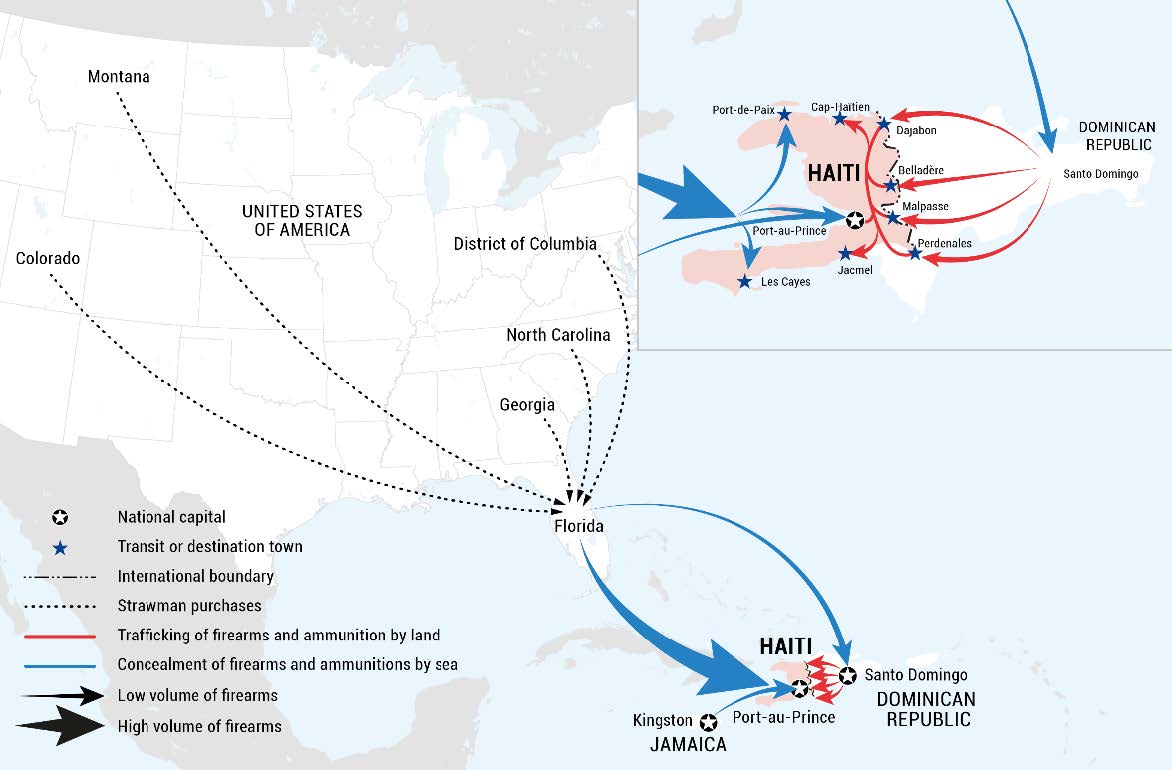Haiti: Illegal Flow of Guns from United States
Gang violence in Haiti is made possible by an illicit supply of arms the island nation does not have the capacity to prevent. Congress can address this with the U.S.-Caribbean Strategic Engagement Act of 2023.
Gang violence in Haiti is made possible by an illicit supply of arms the island nation does not have the capacity to prevent. Congress can address this with the U.S.-Caribbean Strategic Engagement Act of 2023. The following article was published in the September-October 2023 issue of NewsNotes.
On Sunday, Aug. 27, members of a local church in a suburb of the Haitian capital city Port-au-Prince were gunned down by gang members while they were rallying against gang violence in their community. CNN reported that seven people were killed by machine gun fire.
“Haitian criminal gangs and narcos could not hold the country hostage without the continuous flow of handguns, assault rifles, even belt-fed machine guns,” said Doug Barry, a senior adviser for Global Action on Gun Violence, in a letter to the editor published in the Washington Post on Aug. 10.
While exact precise numbers are impossible to calculate, the National Commission on Disarmament, Demobilization and Reintegration estimated in 2020 that there could be as many as 500,000 pistols, rifles, and light machine guns in the island nation with a population of 11 million. The national police reported only 58,000 registered guns in 2015. Assuming these figures, Haiti’s law enforcement agents are outgunned by Haitian residents, private security company personnel, and armed gangs nearly ten to one.
Where do most of the weapons on the streets of Haiti come from? Sadly, the answer is the United States.
A UN report released in March mapped the source of illegal firearms to Haiti, exposing the network of criminal actors who often purchase weapons in Florida or other U.S. states with weak gun laws (Colorado, Georgia, Montana, North Carolina). The guns from these other states are transported to Florida from where they are illegally smuggled into Haiti. The guns might travel by land from the neighboring Dominican Republic; by air, including to clandestine airstrips; but most frequently they arrive by sea.
The numbers are staggering. One port of the Dominican Republic alone captured 112,000 units of firearms and ammunition heading to Haiti in the first six months of 2022. Most of these heralded from the United States.
Barry characterized the Haitian police and military as not well-equipped to deal with this level of smuggling, resulting in the few illegal weapons seized comprising “only a fraction” of the illicit arms coming into the country. “Last summer, an arsenal was found in the hold of a ship labeled as goods from a religious charity,” he wrote.
One way to address the Haitian arms trafficking would be the passage of the U.S.-Caribbean Strategic Engagement Act of 2023 (H.R. 4015.) According to the Quixote Center, the act would require the U.S. government to create a strategy to reduce the illicit trafficking of guns from the U.S. to the Caribbean and would also provide technical support and training to Caribbean security forces that monitor maritime borders to prevent illicit weapons from entering Caribbean countries.
Faith in action:
Tell your U.S. Representative to stop the flow of illegal guns to Haiti by supporting the U.S.-Caribbean Strategic Engagement Act https://mogc.info/HR4015
Map of the routes of illegal gun shipments from the UNDOC report.

